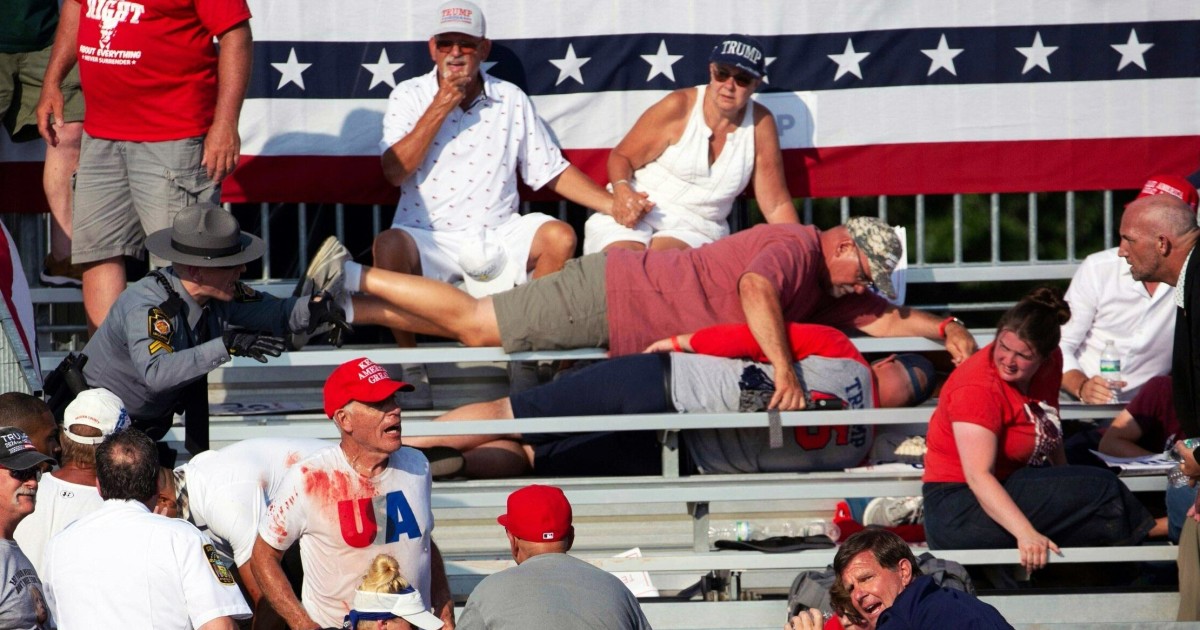Concerns about the rising prevalence of violent threats and a growing list of violent attacks on politicians were punctuated Saturday when a gunman killed at least one person during an assassination attempt on former President Donald Trump.
The shooting immediately sparked concerns that the already-heated election cycle would lead to more violence.
“In a country where a great many Americans do not believe that their democracy is healthy or particularly functional, and where a large majority of Americans believe that the domestic political opposition is out to destroy that democracy, this is the worst sort of event that can happen in that environment,” Ian Bremmer, a political scientist and president of the Eurasia Group, said in a video posted online shortly after the shooting.
Bremmer added that he was “deeply worried that it presages much more political violence and social instability to come.”
University of Chicago professor Robert Pape, director of the Chicago Project on Security and Threats, said in an email that a national survey he helped conduct in June found that 10% of American adults, a third of whom own guns, agreed that the “use of force is justified to prevent Donald Trump from becoming president.”
“We also need to worry about threats in retribution to President Biden. Our survey shows 7% of American adults (18 million) support force to restore Trump to the presidency, half of whom own guns,” Pape said.
“Political leaders from both parties and at all levels of government — the President, Senate and House leadership, governors, and mayors must immediately condemn political violence from whichever side of politics it arises,” he added.
Political scientists and extremism experts have been warning in recent years that escalating political polarization has coincided with threats and acts of violence becoming a common part of the U.S. political sphere.
Various surveys and studies have documented the rise of such threats, including those directed at local officials. The Brennan Center for justice at New York University Law School released a report in January that found it was not just well-known national politicians who have faced more threats, with 43% of state legislators and 18% of local officeholders saying they had received threats. The Combating Terrorism Center at the U.S. Military Academy at West Point, New York, found federal charges related to threatening public officials jumped sharply in recent years — a trend that looked to be continuing.
“A preliminary review of cases from 2023 and 2024 shows that the number of federal prosecutions is on pace to hit new record highs,” the West Point study said.
Erik Nisbet, a professor of policy analysis and communication at Northwestern University who has studied political violence, said in an email that violent threats were on the rise for politicians at all levels of government.
“Since 2016, there has been a huge upsurge in political threats targeting Democrat and Republican elected officials alike — at all levels and functions of government including federal, state and local,” he said in an email.
In 2017, Rep. Steve Scalise of Louisiana was shot at a practice for the congressional softball game. Scalise was the third-ranking Republican in the House at the time. In 2020, several men in Michigan conspired to kidnap Gov. Gretchen Whitmer, and a hammer-wielding suspect attacked Nancy Pelosi’s husband at their San Francisco home in 2022.
Nisbet warned that violent threats were becoming normalized in U.S. politics, noting a national survey conducted by Northwestern found that both parties had begun to embrace violence.
“Our own national survey conducted by the Northwestern University Center for Communication & Public Policy shortly after the 2022 midterm election revealed that equal numbers of Democrats and Republicans believed threatening the other party’s political leaders was justified at least in some cases and equal numbers within each party each reported political violence was justified to advance their political goals,” he said in an email.
Some political scientists have warned that growing disillusionment and skepticism of elected officials and the government as a whole have only accelerated the acceptance of violence.
Katherine Keneally, director of threat analysis at the Institute for Strategic Dialogue, a nonprofit group that studies extremism, said many threats are from people inspired by false or misleading information.
“Unfortunately, what we are seeing is a concerning uptick in threats to officials based on false and/or misleading narratives, as well as disagreements on policy or beliefs,” she said in an email. “While a lot about this horrific incident and the attacker is unknown, we are seeing threats to officials by people who don’t appear to be affiliated with any particular extremist group, but are instead inspired by conspiracy theories, mis/disinfo, and differences in political ideologies. Again, very little information is known, but political violence in all forms should be condemned.”

